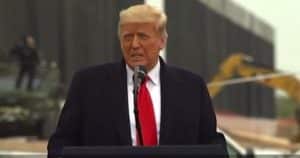Court Blocks Sale of Border Wall Supplies
A legal decision has temporarily halted the Biden administration's disposal of border wall materials, marking another episode in the ongoing debate over U.S. immigration policy, JustTheNews.com reports.
A federal court granted a 30-day cessation of the sale of border wall materials after Texas Attorney General Ken Paxton filed a lawsuit, aligning with efforts to support the forthcoming administration of President-elect Donald Trump.
The contentious issue of the U.S.-Mexico border wall resurfaces with this recent court ruling, emphasizing the differing agendas between the current and incoming administrations. Originally, the Biden administration had been liquidating surplus materials intended for the border wall. This action was in line with the National Defense Authorization Act, through which Congress authorized the sale of unused resources. The Biden administration's steps followed its prior decision to stop the construction of the border wall.
Legal Action in Texas Leads to Court Decision
Texas Attorney General Ken Paxton spearheaded the legal challenge that resulted in the court order. Speaking on the successful injunction, Paxton stated that they have effectively stopped the Biden administration from discarding more border wall assets before Trump assumes office again. He remarked, "This follows our major victory forcing Biden to build the wall." Paxton emphasized the intent to hold the administration accountable for actions he perceives as bypassing national border security.
For the Biden administration, complying with the court's directive to halt these sales temporarily indicates the ongoing legal complexities in managing immigration policy. According to reports from Fox News, the administration has agreed to the 30-day suspension as ordered by the court.
Political Clashes Over Border Wall Continue
The issue has again highlighted a significant political clash, especially with Texas openly committing to assist Donald Trump in his aim to complete the border wall project. Paxton underscores this commitment by suggesting that their legal actions were motivated by a desire to counteract what he sees as Biden's attempts to undermine Trump's future immigration plans.
Donald Trump also weighed in on the situation, offering sharp criticism of the current handling of border wall materials. Trump's comments reflect his belief in the necessity and economic efficiency of utilizing existing resources. He remarked, "What they're doing is really an act, it's almost a criminal act." Trump's concerns about potential costs were made clear as he cautioned that if current materials are not used, rebuilding could be financially double what was invested initially, involving hundreds of millions of dollars.
Implications for Future Immigration and Border Policies
The impact of the court decision extends beyond immediate legal ramifications, potentially affecting broader strategies on border security and immigration. As these materials remain unsold for a temporary period, the future of border wall completion remains uncertain amidst looming presidential transitions.
This court order highlights ongoing national debates on immigration, dividing public opinion and political leaders alike. While Biden’s administration had moved to sell off unused wall materials, the coming Trump administration, backed by states like Texas, aims to reverse these actions.
Thus, the temporary halt may prove to be pivotal in setting the stage for future policies addressing border security, particularly as Trump prepares for his forthcoming term. As the legal process unfolds, greater clarity will likely emerge regarding how both administrations will navigate these complex challenges.
Immediate Reaction and Future Considerations
The development prompts immediate attention from both supporters and opponents of the border wall. The halt signifies not only a pause in material sales but also a reevaluation of how U.S. border policy will be executed under changing political leadership.
The Biden administration's response in complying with the ruling demonstrates an acknowledgment of the legal challenges they face as they seek to balance between federal mandates and shifting political landscapes. Paxton’s and Trump’s vocal positions underscore the enduring debate over national immigration strategies. This legal intervention by Texas represents a critical juncture in the broader dialogue about how best to secure U.S. borders.
With this court order in place, both current and future administrations may need to address the financial and operational implications of the border project actively. This decision marks one of many steps in navigating the complexities of border management in the U.S., presenting challenges and opportunities that will shape the country's approach to immigration and security in years to come.




